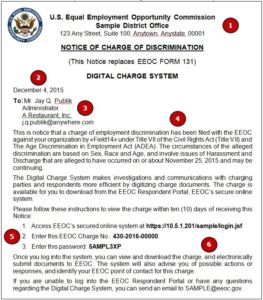 If you have filed a complaint with the federal Equal Employment Opportunity Commission (EEOC), you are most likely dealing with some kind of serious situation at work. You want it dealt with as soon as possible. How fast a response is possible depends on a number of issues. The reality is that the agency has a lot of responsibilities, but it is not flush with resources.
If you have filed a complaint with the federal Equal Employment Opportunity Commission (EEOC), you are most likely dealing with some kind of serious situation at work. You want it dealt with as soon as possible. How fast a response is possible depends on a number of issues. The reality is that the agency has a lot of responsibilities, but it is not flush with resources.
The EEOC and What It Does
 The agency is responsible for investigating and, at times, litigating most employment discrimination practices made illegal under federal law. Here are some statistics from the EEOC:
The agency is responsible for investigating and, at times, litigating most employment discrimination practices made illegal under federal law. Here are some statistics from the EEOC:
- The agency received 89,385 charges of workplace discrimination in fiscal year 2015. It resolved 92,641 charges and obtained more than $525 million for complainants through settlements and litigation.
- Locally, 694 complaints were filed in the District of Columbia, 2,349 in Maryland, and 2,844 in Virginia.
- Texas leads the country with 9,539 complaints.
The average time between charge filing and resolution in 2015 was nearly 10 months, according to the EEOC. This is an average, so for every case that is quickly settled, another case drags on longer. The length of time for an investigation can depend on the complexity of the case, the parties’ cooperativeness, the investigator’s caseload, and his or her abilities.
The EEOC has a voluntary mediation program that invites both parties to try to resolve the matter after the complaint is filed. If that route is not taken or is not successful, the agency asks the employer for a written answer to the complaint (called the “Respondent’s Position Statement”). A complainant (the person filing the complaint) can request the Respondent’s Position Statement to review it and respond to it. The EEOC would like this response within 20 days.
How the agency investigates the case depends on the facts and what information the investigator wants to gather.
- An investigator may ask the employer to answer questions about your claims. He or she may visit the employer and interviews and gather documents.
- If an employer is not cooperative, the EEOC can issue a subpoena to obtain documents, take testimony, or gain access to facilities.
- You and your witnesses should also be interviewed.
The investigation is supposed to be completed within 180 days after the filing of the complaint. The EEOC is required to develop an impartial and appropriate factual record to make findings on the claims raised by the complaint. This record is one that should allow a reasonable fact-finder to draw conclusions as to whether discrimination occurred.
You can check the status of your charge by using the EEOC’s Online Charge Status System. The agency notifies the parties of its findings after it finishes the investigation. If you are a federal employee filing a discrimination complaint, there is a different process for an investigation.
Filing a Charge and Getting Off to a Good Start
 You can file the discrimination charge at the EEOC office closest to your home or at any of the EEOC’s 53 field offices. However it is filed, your charge will likely be investigated at the EEOC office closest to where the alleged discrimination occurred.
You can file the discrimination charge at the EEOC office closest to your home or at any of the EEOC’s 53 field offices. However it is filed, your charge will likely be investigated at the EEOC office closest to where the alleged discrimination occurred.
The agency does not file charges based on complaints over the telephone, but you can ask the EEOC for help in filing your claim. If you call 1-800-669-4000, you can provide basic information, and it will be forwarded to the EEOC field office covering your area. After that field office receives your information, an intake officer will contact you and discuss your situation.
You can also go to an EEOC office and ask questions about the process and file a charge in person (call ahead to set an appointment). If you go to an office in person, bring with you whatever documents you have concerning your job and any evidence you have supporting your claims. You could file a complaint by mail, but you are better off filling out the EEOC’s Form 5. It is the agency’s charge form with the required information to get your case started.
Summing It Up
On average, the EEOC process takes about 10 months, though the investigation should be completed within 180 days after a complaint is filed. As you can see, these numbers do not match. The reality is that investigations take longer than they should. After those 180 days pass, many complainants take their charges away from the EEOC and file them in court.
Before filing an EEOC complaint, call our office. We can explain to you what to write and what to do.
- The complaint is a critical document. It spells out what you believe happened and why you think discrimination took place.
- In most discrimination cases, credibility is a critical issue. If you write down something that later turns out to be false, your credibility may be harmed. Depending on the outcome of the investigation, that may be fatal to your case.
- Providing the evidence you have along with names and contact information for witnesses should speed up the process.
The EEOC is an organization that has been asked to do a lot by Congress. Unfortunately, Congress does not fully fund the agency, so it is unable to do what it needs to do within a reasonable time frame. You may work with very helpful employees or employees who may be unwilling or unable to be very helpful, not unlike many large organizations we all have to deal with.
You may be angry at your employer (or former employer) or unhappy with the EEOC process. Venting that on the investigator assigned to your case will not help. Be as friendly and professional as you can when dealing with the EEOC. Though there is no guarantee you will get a good outcome since you are asking an investigator to see things your way, being uncooperative or unfriendly will not help you achieve your goals.
If you believe that you have been discriminated against, contact our office so you can talk to one of our discrimination lawyers to discuss why you think you have been the victim of discrimination, how the law may apply, what the EEOC is likely to do, and what your best options are for protecting your rights and interests.





